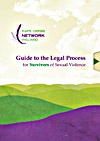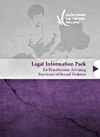If the abuse happened a while ago, staff can help you with emotional support and counselling
It is important to realise that the trauma of an attack will have both short-term and long-term effects on your life. Expert support in examining and dealing with these effects is your right. Contact with others who acknowledge and understand your experience and how it has affected you will break the isolation you may feel.
What can I expect from counselling?
Counselling gives you time and space to explore your feelings. Our aim in counselling is to help you to reach your full potential, so that your experience of sexual violence no longer controls or overwhelms your life, behaviour and choices.
The counsellor is a professional so you do not need to protect her or him from the intensity of your feelings or the details of your trauma, as you might feel you need to do with the family members or friends you confide in.
You can see a counsellor in a Rape Crisis Centre even if you do not report to the police or go for a medical examination. It does not matter how long ago the assault happened.
How long will I be in counselling?
The pace of healing is very individual. It is affected by such things as the duration and intensity of the sexual violence, your relationship to the person who assaulted you, previous traumatic experiences and the degree of support you have outside of the counselling setting. You may be with us for six sessions or 60. People often begin with weekly sessions and then spread out the time between sessions as they become better able to manage on their own.
Will I see the same counsellor all the time?
Yes. The first time you come to the Rape Crisis Centre, a counsellor will explain how we work. After that introductory session, the counsellor assigned to you will contact you and work with you for as long as you need.
Is there any help for my partner, family or friends who may be upset about what I have told them?
Learning that someone you care for has experienced sexual violence can be quite a shock and may leave a supporter feeling helpless. We have a counsellor who can talk through this with them either on the helpline or face to face. To find out more, go to: Supporting survivors of sexual violence. If your supporter is in contact with the same centre as you, we will not give them any information about your progress or case. We will fully respect your confidentiality.
Will counselling help me to forget?
What counselling hopes to achieve is that the event becomes something which no longer takes over or controls your day-to-day life. Forgetting sexual violence is not a realistic or even desirable goal of counselling.
You may find that, in the course of counselling, you begin to develop positive aspects of yourself that have lain hidden or under-developed. Counselling will help you to understand that what you are experiencing is a normal reaction to an abnormal event. This does not in any way minimise the range and intensity of your feelings but reaffirms your normality in the context of what has happened to you.

 Guide to the Legal Process for Survivors of Sexual Violence
Guide to the Legal Process for Survivors of Sexual Violence Legal Information Pack for Practitioners Advising Survivors of Sexual Violence
Legal Information Pack for Practitioners Advising Survivors of Sexual Violence